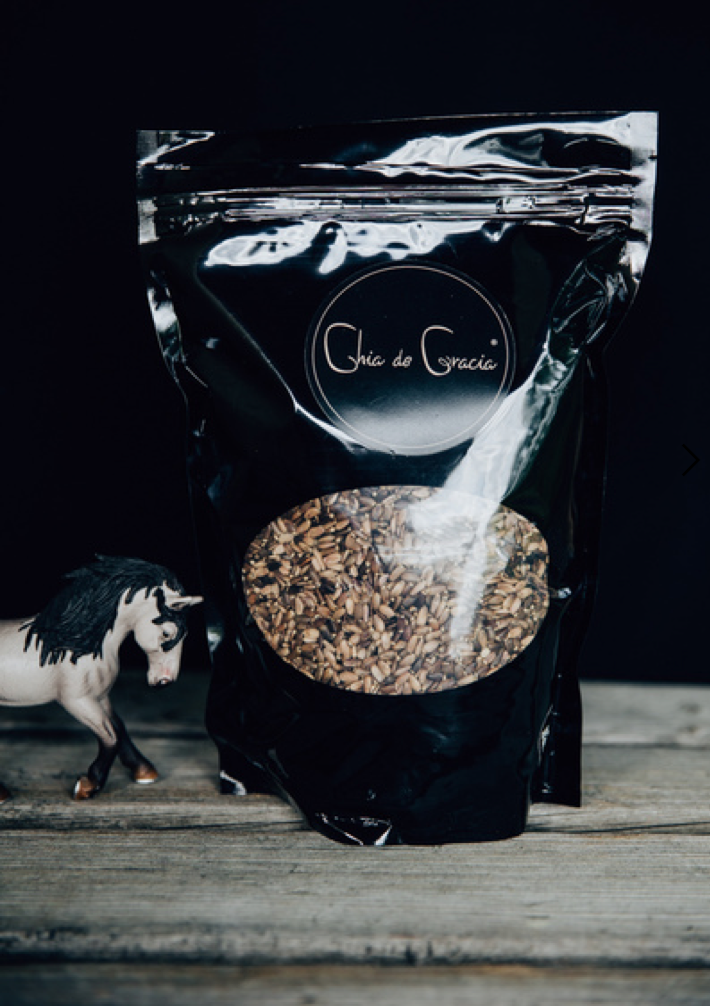Chia de Gracia
Mariendistelsamen 1 kg
Verfügbarkeit für Abholungen konnte nicht geladen werden
Mariendistel gehört zu den wichtigsten Kräutern für die Leber! Enthält Silymarin. Erhält die normale Leberfunktion.
Dosierung:
Pferd 500 KG: 10-40 G / TAG.
Hund: 5-10 G / TAG.
1 EL = 10 G.
**********************
The liver removes toxins from the body before they can damage other organ system, including the heart, blood vessels and skin. When the liver is impaired, either by disease or heavy drug use, the overall effects on the body and long-term health can be greatly affected.
When detoxing, first support the whole process of elimination, then provide specific support for organs that might have been involved. An example of a need for liver and kidney support would be a horse who has been on heavy-duty sulfa drug therapy.
DETOXING AIDS
Our bodies, and our horses’ bodies, efficiently eliminate waste and toxins (and can be enhanced by specific types of herbs):
- through the digestive system (laxatives)
- through the kidneys and urinary system (diuretics)
- through the liver (hepatics)
- through the lymphatic system (lymphatics and tonic herbs)
- through the skin (diaphoretics)
- through the respiratory system (expectorants)
Use gentle remedies when stimulating elimination of any kind. This is particularly important with horses, due in part to their delicate digestive system.
The best herb for liver health is Milk Thistle Seed (silybum marianum).
Milk Thistle seed contains several active constituents; the most important one is bioflavonoid silymarin complex. The silymarin complex, in particular, Silibinin, protects the liver by preventing certain toxins from entering the liver cells and stimulating the regeneration of damaged cells. The silymarin complex is made up of three parts: Silibinin, silidianin, and silicristin. Silibinin is the most active of the three and is mostly responsible for the benefits of the silymarin complex.
The silymarin in milk thistle seed can protect the liver in several different ways:
- Silymarin aids the cells by binding to the outside of the cells and blocking certain toxins from entering.
- Silymarin boosts antioxidant activity by helping cells produce Glutathione, which helps fight free radicals. Silymarin has been shown to raise Glutathione level by 40%.
- Silymarin will increase super oxide dismutase in the red blood cells.
- Silymarin has been found to help cells to synthesize new protein and in doing so helps regeneration.
Milk thistle for horses can be used to promote a healthy liver and, as a result, give nutritional support for healthy skin. It is rich in antioxidants and cleanses and detoxifies the body and helps support new liver cell growth.
Milk thistleseed contains the active ingredient of the silymarin complex. Milk thistle leaf, is not rich in silymarin, and is not a substitute for milk thistle seed.
Milk thistle horse supplement contains:
- Essential oils
- Linoleic acid - an essential fatty acid
- Protein
- Silymarin complex which includes three flavonoids - silibinin, silicristin and silidianin - which are potent antioxidants and fight free radicals
Feed to:
- Horses who need extra support for the liver
- Give nutritional support to the kidneys or pancreas
- Horses for skin support, associated with liver function
- Horses prone to laminitis
The most important aspect of milk thistle seed is its ability to support the liver during drug therapies. Silymarin can help reduce the free radical damage to the liver associated with long-term use of certain medications. Horses who have or have been treated for EPM, Lyme disease and other chronic disorders that require the administration of long-term antibiotic use can benefit from a two- or three-time/year detox containing milk thistle seed and a few other select herbs.
Dosage: a horse 500 kg: 10-40 g /day
Research of Milk thistle seed
Share



